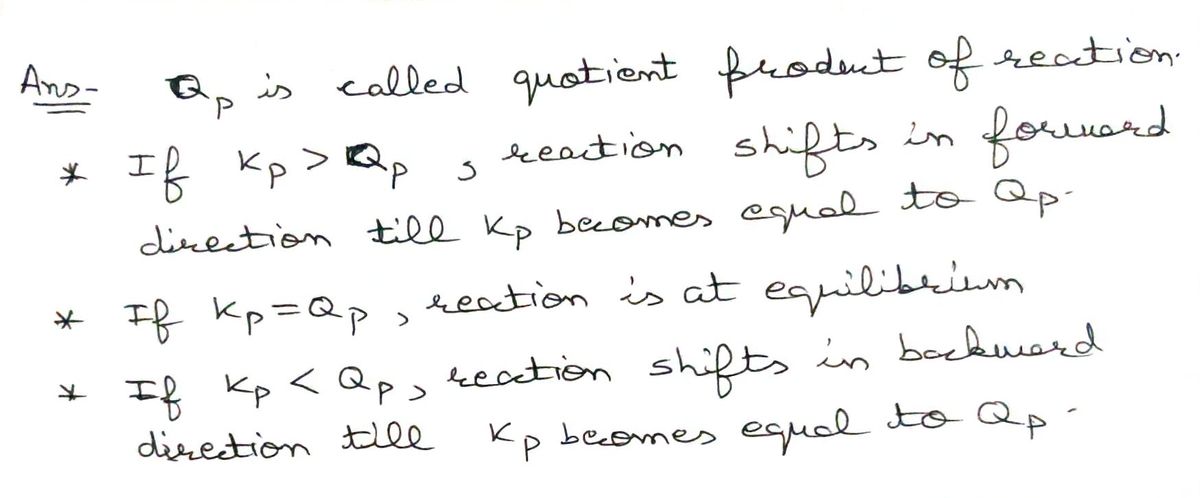O DOOO Consider the following reaction where K,=0.365 at 1150 K: %3D 2sO2(g) O2(g) =2s03(g) If the three gases are mixed in a rigid container at 1150 K so that the partial pressure of each gas is initially one atm, what will happen? Indicate True (T) or False (F) for each of the following; v 1. A reaction will occur in which SO3(g) is produced. | 2. K, will increase. v 3. A reaction will occur in which SO, is produced. v 4. Q is less than K. v 5. The reaction is at equilibrium. No further reaction will occur.
O DOOO Consider the following reaction where K,=0.365 at 1150 K: %3D 2sO2(g) O2(g) =2s03(g) If the three gases are mixed in a rigid container at 1150 K so that the partial pressure of each gas is initially one atm, what will happen? Indicate True (T) or False (F) for each of the following; v 1. A reaction will occur in which SO3(g) is produced. | 2. K, will increase. v 3. A reaction will occur in which SO, is produced. v 4. Q is less than K. v 5. The reaction is at equilibrium. No further reaction will occur.
Chemistry
10th Edition
ISBN:9781305957404
Author:Steven S. Zumdahl, Susan A. Zumdahl, Donald J. DeCoste
Publisher:Steven S. Zumdahl, Susan A. Zumdahl, Donald J. DeCoste
Chapter1: Chemical Foundations
Section: Chapter Questions
Problem 1RQ: Define and explain the differences between the following terms. a. law and theory b. theory and...
Related questions
Question
100%
![[Review Topics]
Use the References to access important values if needed for this question.
DODOOO
Consider the following reaction where K, = 0.365 at 1150 K:
%3D
2SO2(g) + O2(g) 2s03(g)
If the three gases are mixed in a rigid container at 1150K so that the partial pressure of each gas is initially one atm, what will happen?
Indicate True (T) or False (F) for each of the following;
v 1. A reaction will occur in which SO3(g) is produced.
|2. K, will increase.
v 3. A reaction will occur in which SO, is produced.
v 4. Q is less than K.
v 5. The reaction is at equilibrium. No further reaction will occur.
Submit Answer
Retry Entire Group
7 more group attempts remaining
Previous
Next](/v2/_next/image?url=https%3A%2F%2Fcontent.bartleby.com%2Fqna-images%2Fquestion%2F0302d151-67c6-4a38-b8ed-016ad2821626%2Fdbc63766-47c6-4286-93df-f5d26f54b9b8%2Fxv5m4bp_processed.jpeg&w=3840&q=75)
Transcribed Image Text:[Review Topics]
Use the References to access important values if needed for this question.
DODOOO
Consider the following reaction where K, = 0.365 at 1150 K:
%3D
2SO2(g) + O2(g) 2s03(g)
If the three gases are mixed in a rigid container at 1150K so that the partial pressure of each gas is initially one atm, what will happen?
Indicate True (T) or False (F) for each of the following;
v 1. A reaction will occur in which SO3(g) is produced.
|2. K, will increase.
v 3. A reaction will occur in which SO, is produced.
v 4. Q is less than K.
v 5. The reaction is at equilibrium. No further reaction will occur.
Submit Answer
Retry Entire Group
7 more group attempts remaining
Previous
Next
Expert Solution
Step 1

Trending now
This is a popular solution!
Step by step
Solved in 3 steps with 4 images

Knowledge Booster
Learn more about
Need a deep-dive on the concept behind this application? Look no further. Learn more about this topic, chemistry and related others by exploring similar questions and additional content below.Recommended textbooks for you

Chemistry
Chemistry
ISBN:
9781305957404
Author:
Steven S. Zumdahl, Susan A. Zumdahl, Donald J. DeCoste
Publisher:
Cengage Learning

Chemistry
Chemistry
ISBN:
9781259911156
Author:
Raymond Chang Dr., Jason Overby Professor
Publisher:
McGraw-Hill Education

Principles of Instrumental Analysis
Chemistry
ISBN:
9781305577213
Author:
Douglas A. Skoog, F. James Holler, Stanley R. Crouch
Publisher:
Cengage Learning

Chemistry
Chemistry
ISBN:
9781305957404
Author:
Steven S. Zumdahl, Susan A. Zumdahl, Donald J. DeCoste
Publisher:
Cengage Learning

Chemistry
Chemistry
ISBN:
9781259911156
Author:
Raymond Chang Dr., Jason Overby Professor
Publisher:
McGraw-Hill Education

Principles of Instrumental Analysis
Chemistry
ISBN:
9781305577213
Author:
Douglas A. Skoog, F. James Holler, Stanley R. Crouch
Publisher:
Cengage Learning

Organic Chemistry
Chemistry
ISBN:
9780078021558
Author:
Janice Gorzynski Smith Dr.
Publisher:
McGraw-Hill Education

Chemistry: Principles and Reactions
Chemistry
ISBN:
9781305079373
Author:
William L. Masterton, Cecile N. Hurley
Publisher:
Cengage Learning

Elementary Principles of Chemical Processes, Bind…
Chemistry
ISBN:
9781118431221
Author:
Richard M. Felder, Ronald W. Rousseau, Lisa G. Bullard
Publisher:
WILEY